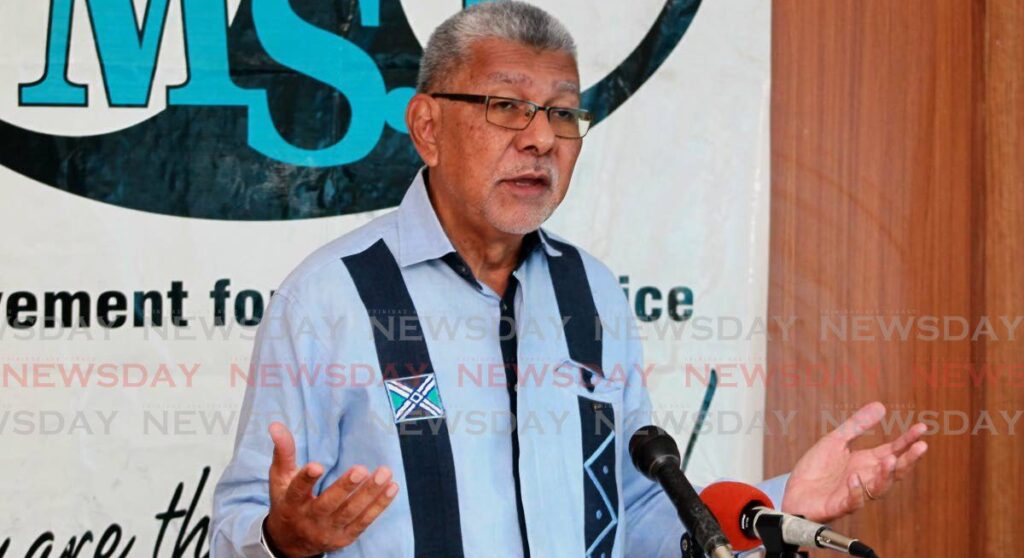Abdulah: 75% of workers not unionised

MOVEMENT for Social Justice (MSJ) leader David Abdulah lamented three quarters (75 per cent) of workers in Trinidad and Tobago do not belong to a trade union, speaking to reporters on June 5 at a briefing in Woodford Square, Port of Spain.
He was joined by Oifield Workers Trade Union (OWTU) officials Sati Gajadhar-Inniss (first vice president) and Ozzie Warwick (general secretary) to launch a campaign to encourage people to join trade unions in protection of their rights, in the lead-up to Labour Day on June 19.
The trio later distributed leaflets to people on Frederick Street explaining their rights to a minimum wage, national insurance, maternity protection, occupational health and safety and retrenchment and severance benefits.
Abdulah gave reporters figures which indicated trade union membership has plummeted over the years from about 65 per cent to 25 per cent of the workforce.
"When I joined the trade union movement, way back in 1977, it was 65-70 per cent of the labour force was unionised. That has flipped in the last 40-odd years
"It is not peculiar to TT. This is a global thing, as a result of neoliberal, capitalist economic policies, designed to weaken the trade union movement and weaken workers' power, to enable capital to accumulate more and more wealth for the one per cent."
Abdulah said a recent study showed an average US worker would take 200 years to earn their CEO's yearly salary. He said CEOs in some state companies in TT earn $80,000 or $90,000 per month, plus perks such as car and housing. He calculated that someone on the minimum wage in TT would take two years to earn what a CEO earns in a month.
"That is the level of inequity in society.
"The drive to get rid of unions has resulted in more inequality. Those societies that have high rates of unionisation tend to have less income inequality."
He blamed the current state of affairs on structural readjustment since the 1980s, even as he recalled DEWD – forerunner of URP – had been unionised (represented by NUGFW). Abdulah said grass-cutting in public spaces used to be done by unionised workers in municipal corporations but nowadays is done by non-unionised workers in private companies contracted by CEPEP.
Abdulah said the decline in union membership was also worsened by major retrenchments, namely the defunct Petrotrin and Arcelor-Mittal, plus TSTT, and energy-sector service companies are no longer unionised.
"The setting-up of special-purpose companies like the Educational Facilities Company Ltd, all of those have resulted in a shift.
"Then the multiplicity now of service employment – which essentially is low-skilled, relatively low-paid work – are the sectors that have been growing: security, fast foods, casinos, malls. All of those have expanded in the last 25-30 years."
Abdulah said previously workers had good, decent jobs at manufacturing companies like Unilever, which had since shut.
"There has been a shift in the structure of the labour force, which is not good."
He said entities like malls generate employment but do not create goods that earn foreign exchange and sustain good jobs.
"That is why we have to diversify and transform the economy, and by doing so transform the structure of the labour market."
Abdulah said the Industrial Relations Act (IRA) was very punitive, and it took many years for a union to be recognised as representing a group of workers.
He said if you wanted to unionised workers at a fast food franchise, you had to visit all the company's outlets and persuade 51 per cent of the workers to join and pay union dues together for at least eight consecutive weeks.
"So if some join this week, some join next week and some join 20 weeks from now, you don't have 51 per cent unless those who join now are also paying 20 weeks from now.
"And during that period, if the employer gets wind of it, and sends home for whatever reason – victimisation or whatever – some of the workers, you lose your 51 per cent by the time you go to the recognition board.
"So the law makes it extremely difficult and it (IRA) is an anti-worker piece of legislation."
He said a local law professor once said TT has the Caribbean's most repressive labour laws. Despite that, he said, workers must be educated on those rights they do have under the law, as the MSJ now sought to do.
"It is only an MSJ government that would amend the labour legislation in a way to properly allow the right of a worker to join a union of their choice which is an ILO convention that is being breached in TT."
Newsday asked if the MSJ had confidence in the Industrial Court, whose president (Deborah Felix-Thomas) was recently replaced.
He replied, "Our policy position, which we re-stated to the advisory committee on constitutional reform, is that Industrial Court judges ought to be appointed in a similar way to judges of the High Court."
As a court of superior record, the Industrial Court's members should be appointed by the Judicial and Legal Services Commission, not by a convoluted process involving Cabinet and the President, Abdulah argued.
Asked about victimisation, he said someone can directly approach a union of their choice and directly pay their dues over the counter, so their employer need not know.
"Workers should join."
Asked about union-busting, he replied this had occurred at Petrotrin. He said while the State had shut the refinery, it had also unnecessarily sent home workers from the exploration and production unit, which role was to be retained.
He also named Tidco, while Gajadhar added, "TSTT, with the creation of bMobile."
She said, "A lot of times they create sub-companies that actually deteriorate the original company, and they change the terms and working conditions of the employees that are coming into that company."

Comments
"Abdulah: 75% of workers not unionised"